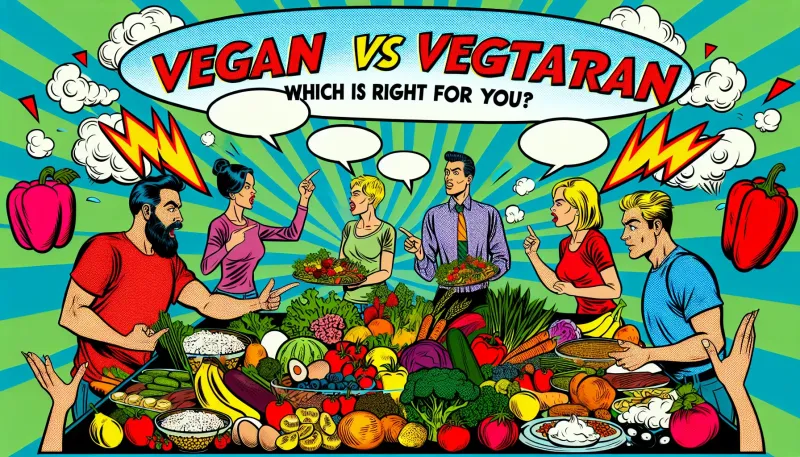Vegan Diet vs Vegetarian: Which is Right for You?

Explore the differences between vegan and vegetarian diets, their benefits, and how to decide which one is right for you.
In recent years, the popularity of plant-based diets has soared. Among the most common are vegan and vegetarian diets. Both offer myriad health benefits and advantages for the environment, yet they differ significantly in their principles and restrictions. In this article, we'll delve into the basics, benefits, and challenges of each diet to help you determine which is the best fit for your lifestyle.
Understanding the Diets
What is a Vegetarian Diet?
A vegetarian diet excludes meat, fish, and poultry but typically includes dairy products and eggs. There are several types of vegetarianism, including:
- Lacto-vegetarian: Includes dairy products but excludes eggs.
- Ovo-vegetarian: Includes eggs but excludes dairy products.
- Lacto-ovo vegetarian: Includes both dairy products and eggs.
- Pesco-vegetarian: Includes fish and seafood but excludes other meat varieties.
What is a Vegan Diet?
A vegan diet excludes all animal products, including meat, fish, poultry, dairy, and eggs. Vegans also avoid foods containing animal-derived ingredients, such as gelatin or honey. Veganism often extends beyond diet; many vegans choose not to use products made with animal by-products such as leather, wool, and certain cosmetics.
Benefits of Vegan and Vegetarian Diets
Health Benefits
Both diets are associated with numerous health benefits, including reduced risk of chronic diseases. However, the extent of these benefits can vary slightly between the two.
- Heart Health: Both diets tend to be lower in saturated fats and cholesterol, which can help improve cardiovascular health. Plant-based diets are also rich in fiber, antioxidants, and certain vitamins.
- Weight Management: Many individuals find it easier to maintain or lose weight on plant-based diets due to the lower calorie density and higher fiber content.
- Diabetes Management: Certain studies have shown that plant-based diets can help regulate blood sugar levels and improve insulin sensitivity.
- Better Digestion: The high fiber content aids in digestion and promotes a healthy gut microbiome.
Environmental and Ethical Benefits
Both diets offer significant environmental and ethical benefits by reducing the demand for animal agriculture, which is a major contributor to environmental degradation.
- Resource Efficiency: Plant-based diets require fewer natural resources, such as water and land, compared to meat production.
- Lower Greenhouse Gas Emissions: Reducing or eliminating animal products from your diet can significantly decrease your carbon footprint.
- Animal Welfare: Both diets can alleviate animal suffering by decreasing the demand for animal farming.
Challenges and Considerations
Nutritional Considerations
While both diets offer numerous health benefits, they also come with potential nutritional challenges.
- Protein Intake: Plant-based diets require careful planning to ensure adequate protein intake. Sources include legumes, nuts, seeds, and soy products like tofu and tempeh.
- Vitamin B12: Vitamin B12, crucial for nerve function and blood health, is naturally found in animal products. Vegans, and to a lesser extent vegetarians, should consider fortified foods or supplements.
- Iron: Plant-based iron (non-heme iron) is less readily absorbed than iron from animal products. Combining iron-rich foods with vitamin C sources can enhance absorption.
- Calcium: Vegans need to find alternative sources of calcium, such as fortified plant milks, leafy greens, and tofu.
- Omega-3 Fatty Acids: These essential fats, particularly DHA and EPA, are commonly found in fish. Vegans can consider algae-based supplements or eat flaxseeds, chia seeds, and walnuts.
Social and Practical Considerations
Adopting a vegan or vegetarian diet can also pose certain social and practical challenges.
- Social Situations: Dining out or attending social events may pose difficulties in finding suitable options. Preparing is key.
- Family and Cultural Traditions: Existing family habits and cultural traditions might require adjustments.
- Accessibility: Depending on where you live, finding vegan- or vegetarian-friendly foods and products can vary in difficulty and cost.
Making the Decision: Vegan Diet vs Vegetarian
Personal Goals and Preferences
Consider your personal goals, preferences, and lifestyle when choosing between a vegan and vegetarian diet.
- Health Goals: If your primary goal is maximum health benefits and weight loss, a vegan diet might offer a slight edge due to the complete elimination of animal products.
- Ethical Considerations: For those strongly motivated by animal welfare, veganism offers a more comprehensive approach.
- Transition Ease: For individuals looking for a less drastic dietary change, starting with vegetarianism might be more manageable.
Steps to Transition
Consider these steps to ease your transition to a vegan or vegetarian diet:
- Gradual Changes: Start by incorporating more plant-based meals into your diet gradually.
- Education and Planning: Learn about nutritional needs, meal planning, and cooking techniques to ensure a balanced diet.
- Experiment with Foods: Explore a variety of plant-based foods and recipes to keep meals exciting and satisfying.
- Support Systems: Seek support from online communities, local meetups, or friends who share similar dietary goals.
Conclusion
Choosing between a vegan diet and a vegetarian diet depends largely on your personal motivations, health goals, and lifestyle. Both diets offer substantial benefits for your health and the planet, but they also come with unique challenges. By understanding these nuances and planning accordingly, you can make an informed decision that aligns with your values and needs. Whether you opt for veganism, vegetarianism, or a combination of the two, embracing a plant-based diet can be a rewarding and impactful choice.



























